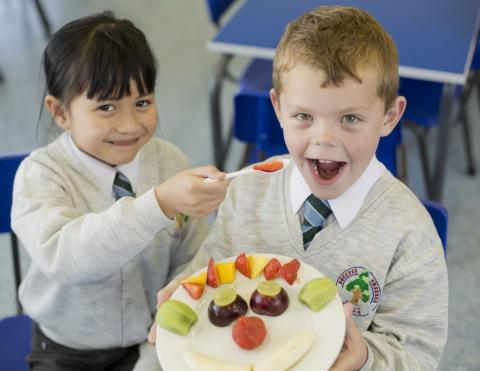Healthy break: providing your child with fuel for school

The Public Health Agency (PHA) is today launching a new resource pack designed to assist schools to deliver a healthy break scheme.
All primary schools across Northern Ireland will receive a resource pack – ‘Healthy Breaks for Schools’ – which includes a poster for the schools to display and information leaflets for parents to explain why healthy breaks are so important, as well as suggestions for the types of foods and drinks that can be included in a healthy break.
The Department of Education and Department of Health, Social Services and Public Safety recently launched ‘Healthy Food for Healthy Outcomes: Food in Schools Policy’ which builds on the nutritional standards which were introduced in 2007 by the Department of Education.
The Food in Schools Policy encourages a ‘whole school approach’ to all food and drink provided and consumed within a school setting. This ensures that pupils have the opportunity to benefit from a healthy balanced diet and aids learning in the classroom, leading to improved educational outcomes. The new policy document requires that every school should have their own whole-school food policy in place by 24 September 2014.
Judith Hanvey, Regional Food in Schools Co-ordinator, who was jointly appointed by the PHA and the Department of Education, commented:
“Currently morning break schemes operate in many schools across Northern Ireland. However, the criteria for these schemes and how they are implemented vary from school to school.
“To develop a consistent approach across the region, the PHA has produced the ‘Healthy Breaks for Schools’ guidance and schools are being encouraged to adapt existing breaks schemes or to develop new ones to follow these guidelines.”
Judith explained why having a healthy break is so important.
“Childhood is a really important time to establish healthy eating habits that will last a lifetime. Having a healthy break including fruit or vegetables and milk or water can help boost concentration levels in the classroom and give pupils the knowledge and opportunity to make healthier choices, which will benefit them throughout life.”
